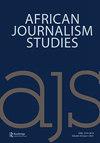Is There Ethnic Othering in Newspapers’ Coverage of Farmers/Herders Conflict in Nigeria?
IF 1.1
3区 文学
Q3 COMMUNICATION
引用次数: 3
Abstract
ABSTRACT The conflict between farmers and herdsmen in Nigeria has been going on for many years, resulting in huge loss of lives and resources, and the media have expectedly been covering the conflict. This study investigated how Nigerian newspapers covered the conflict with a view to finding out if there is ethnic othering in the reportage. A total of three Nigerian newspapers (The Punch, The Sun and Leadership) were purposively selected and studied for a period of seven months (1 January 2018–31 July 2018). About 598 online copies of newspaper articles were content-analysed, with the code sheet as the instrument for data collection. The result was analysed quantitatively, using tables and percentages and supplemented with qualitative analysis using verbal quotes. Findings showed that the newspapers gave adequate coverage of the issue with the straight news format as the most used, while the dominant voices heard in the news reports were those of the Government and victims/residents. The results also showed that there is ethnic othering in the newspapers as reports indicated that the terms “herdsmen” and “Fulani herdsmen” were used interchangeably, with labels like “Fulani terrorists”, ‘Rampaging/marauding Fulani herdsmen”, “killer Fulani herdsmen”, among others.报纸对尼日利亚农民/牧民冲突的报道中是否存在种族歧视?
摘要尼日利亚农牧民之间的冲突已经持续多年,造成了巨大的生命和资源损失,媒体对这场冲突进行了报道。这项研究调查了尼日利亚报纸如何报道这场冲突,以了解报道中是否存在种族差异。共有三家尼日利亚报纸(《Punch》、《太阳报》和《领导力》)被有目的地选中并研究了七个月(2018年1月1日至2018年7月31日)。对大约598份报纸文章的在线副本进行了内容分析,代码表是数据收集的工具。使用表格和百分比对结果进行了定量分析,并辅以口头引用的定性分析。调查结果显示,报纸对这一问题进行了充分的报道,使用最多的是直接的新闻形式,而在新闻报道中听到的主要声音是政府和受害者/居民的声音。结果还表明,报纸上存在种族差异,因为有报道称,“牧民”和“富拉尼牧民”这两个词可以互换使用,标签包括“富拉尼恐怖分子”、“横冲直撞/抢劫富拉尼牧民“、“杀害富拉尼牧民的人”等。
本文章由计算机程序翻译,如有差异,请以英文原文为准。
求助全文
约1分钟内获得全文
求助全文
来源期刊

African Journalism Studies
COMMUNICATION-
CiteScore
1.90
自引率
10.00%
发文量
18
期刊介绍:
Accredited by the South African Department of Higher Education and Training for university research purposes African Journalism Studies subscribes to the Code of Best Practice for Peer Reviewed Scholarly Journals of the Academy of Science of South Africa. African Journalism Studies ( AJS) aims to contribute to the ongoing extension of the theories, methodologies and empirical data to under-researched areas of knowledge production, through its emphasis on African journalism studies within a broader, comparative perspective of the Global South. AJS strives for theoretical diversity and methodological inclusivity, by developing theoretical approaches and making critical interventions in global scholarly debates. The journal''s comparative and interdisciplinary approach is informed by the related fields of cultural and media studies, communication studies, African studies, politics, and sociology. The field of journalism studies is understood broadly, as including the practices, norms, value systems, frameworks of representation, audiences, platforms, industries, theories and power relations that relate to the production, consumption and study of journalism. A wide definition of journalism is used, which extends beyond news and current affairs to include digital and social media, documentary film and narrative non-fiction.
 求助内容:
求助内容: 应助结果提醒方式:
应助结果提醒方式:


